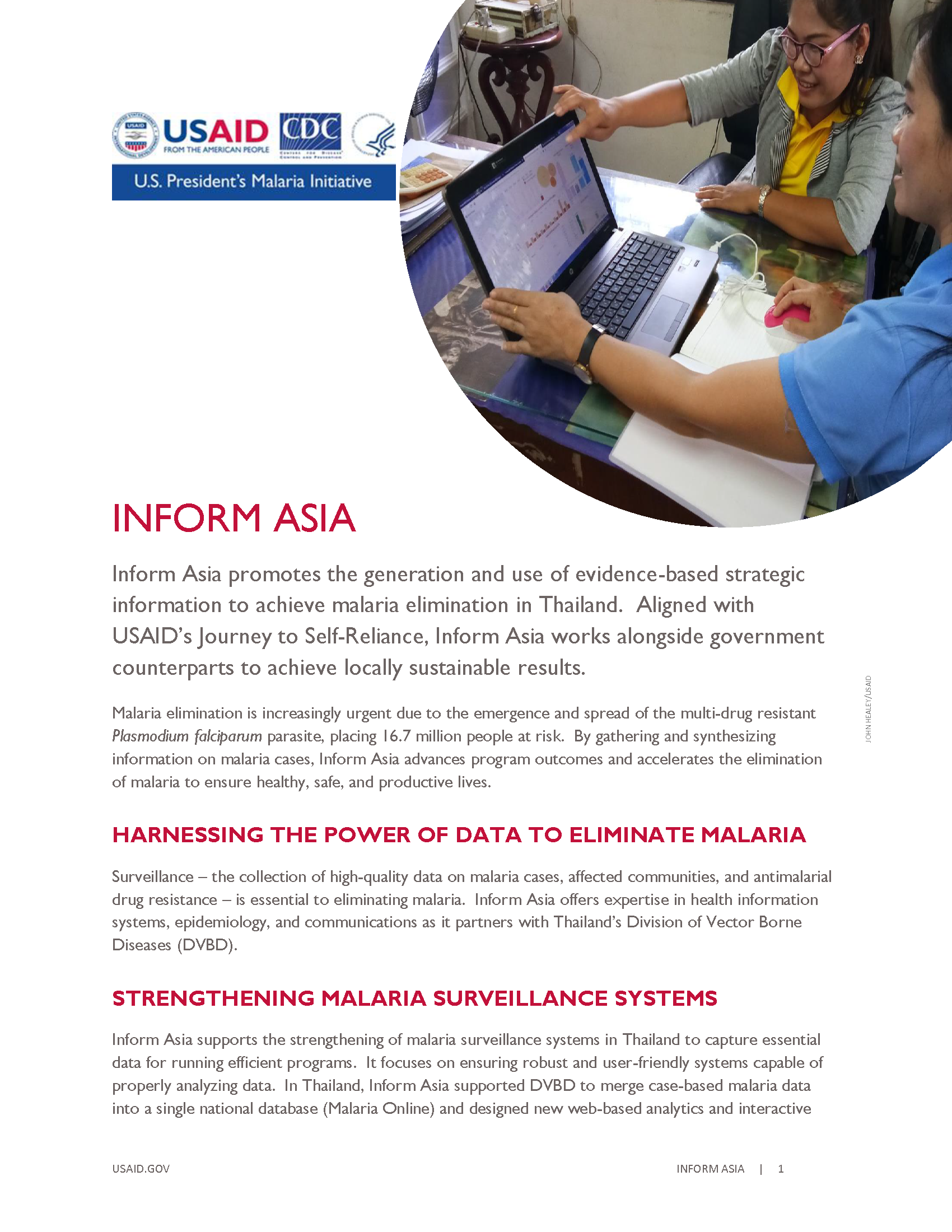Speeches Shim
Inform Asia Fact Sheet ![]() (pdf - 310k)
(pdf - 310k)
Inform Asia promotes the generation and use of evidence-based strategic information to achieve malaria elimination in Thailand. Aligned with USAID’s Journey to Self-Reliance, Inform Asia works alongside government counterparts to achieve locally sustainable results.
Malaria elimination is increasingly urgent due to the emergence and spread of the multi-drug resistant Plasmodium falciparum parasite, placing 16.7 million people at risk. By gathering and synthesizing information on malaria cases, Inform Asia advances program outcomes and accelerates the elimination of malaria to ensure healthy, safe, and productive lives.
HARNESSING THE POWER OF DATA TO ELIMINATE MALARIA
Surveillance – the collection of high-quality data on malaria cases, affected communities, and antimalarial drug resistance – is essential to eliminating malaria. Inform Asia offers expertise in health information systems, epidemiology, and communications as it partners with Thailand’s Division of Vector Borne Diseases (DVBD).
STRENGTHENING MALARIA SURVEILLANCE SYSTEMS
Inform Asia supports the strengthening of malaria surveillance systems in Thailand to capture essential data for running efficient programs. It focuses on ensuring robust and user-friendly systems capable of properly analyzing data. In Thailand, Inform Asia supported DVBD to merge case-based malaria data into a single national database (Malaria Online) and designed new web-based analytics and interactive dashboards for planning and decision-making. Inform Asia is also a key partner in strengthening Thailand’s integrated drug efficacy surveillance system, which monitors the success of treatments and serves as a model for other countries.
EVALUATION STRATEGIES AND TOOLS FOR ELIMINATION
Inform Asia and its partners are investigating ways to maximize the use of new technologies and innovative models to achieve the greatest impact. Inform Asia has collaborated with the DVBD to launch and assess the 1-3-7 surveillance strategy – health officials report malaria cases within one day, investigate cases within three days, and deploy an appropriate response within seven days. This strategy has become a cornerstone of malaria elimination in Asia.
STRENGTHENING CAPACITY IN STRATEGIC INFORMATION
Inform Asia supports the transformation of surveillance data into strategic information, enabling national malaria programs to publish findings in peer-reviewed journals, present at scientific conferences, and share results on social media. Inform Asia also participates in global and local multimedia campaigns, such as highlighting women leaders in malaria elimination during International Women's Day and commemorating achievements for World Malaria Day.
IMPACTS AND RESULTS
- The DVBD and Inform Asia conducted a cost-benefit analysis that found for every Thai Baht invested in malaria elimination, the country could see up to 15 Thai Baht return in savings from fewer hospitalizations and other impacts. This analysis provided the evidence-base to convince the Thai government to fully fund the National Malaria Elimination Strategy 2017–2026.
- The DVBD and Inform Asia found the efficacy of the recommended treatment was waning in two provinces of Thailand through analysis of integrated drug efficacy surveillance data. The two provinces accounted for just 10 percent of national malaria cases, but 67 percent of P. falciparum treatment failures. This information prompted Thailand to revise its treatment policy in the area to ensure full recovery of malaria patients.


Comment
Make a general inquiry or suggest an improvement.